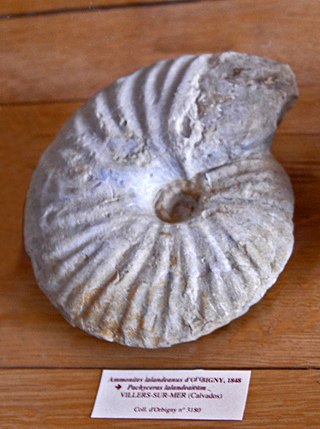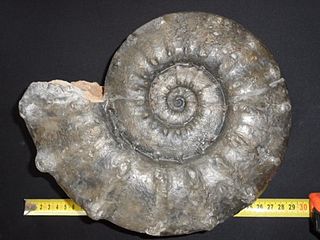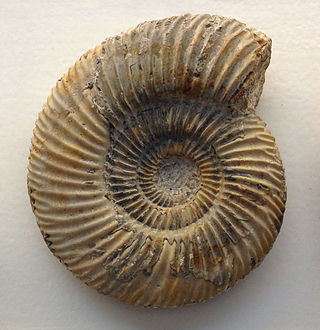
Aulacostephanus is an extinct ammonoid cephalopod genus from the Upper Jurassic Tithonian belonging to the perisphinctoidean family Aulacostephanidae.
Eudmetoceras is an extinct genus from a well-known class of fossil cephalopods, the ammonites. It lived during the Jurassic Period, which lasted from 171.6 to 168.4 million years ago.

Procerites is an extinct genus from a well-known class of fossil cephalopods, the ammonites. It lived during the Jurassic Period.
Okribites is a perisphinctoidean ammonite from the middle Jurassic of the Republic of Georgia. It is assigned to the family Parkinsoniidae, a group of strongly but evenly ribbed evolute, commonly discoidal ammonites. Parkinsonia is a related genus.

Hyperlioceras is an extinct genus of cephalopod included in the ammonitid family Graphoceratidae that lived during the Bajocian stage of the Middle Jurassic. The type species is Hyperlioceras discites

Phylloceras is an extinct genus of ammonoid cephalopods belonging to the family Phylloceratidae. These nektonic carnivores lived from Early Jurassic to Late Cretaceous.

Berriasellinae is a subfamily of very late Jurassic and very early Cretaceous perisphinctoid ammonites in the family Neocomitidae. Berriasellinae comprises generally compressed, evolute genera, typically with furcated ribbing, and in some a smooth ventral band or groove. Berriasellinae are derived from the Ataxioceratidae and gave rise to the other Neocomitidae. The short lived Himalayitidae from the uppermost Jurassic have a similar appearance but differ in being generally broader and having sharper ribbing.

Lytoceras is an ammonite genus that was extant during most of the Jurassic and Cretaceous periods, and is the type genus for the family Lytoceratidae. These cephalopods were fast-moving nektonic carnivores.

Pachyceras is a genus of perisphinctoid ammonites from the Middle Jurassic, upper Callovian stage, and is the type genus for the family Pachyceratidae. The shell is involute, subglobular, with a deep umbilicus and flattened flanks that slope toward a more narrowly rounded venter, and covered by low, widely spaced ribs.

Euaspidoceras is an extinct ammonoid cephalopod genus that lived during the Middle Jurassic.

Harpoceras is an extinct genus of ammonite belonging to the family Hildoceratidae. These cephalopods existed in the Jurassic period, during the Toarcian age from the Falciferum zone to the Commune subzone of the Bifrons zone. They were fast-moving nektonic carnivores.

Parkinsoniidae is a family of ammonites belonging to the order Ammonitida. The cephalopod family lived from the Bajocian stage to the Bathonian age of the Middle Jurassic.

Parkinsonia is a genus of ammonites belonging to the family Parkinsoniidae.
Reynesocoeloceras is genus of ammonite that lived during the lower Pliensbachian stage of early Jurassic, ammonite zones Ibex—Davoei.
Reynesoceras is genus of ammonites that lived during the upper Pliensbachian stage of early Jurassic. It has evolved from Prodactylioceras, or Cetonoceras. Dactylioceras (Eodactylites) has probably evolved from this genus. Aveyroniceras is a name for macroconchs of this genus. Their fossils were found in Europe, northern Africa, Asia, North America and South America.
Reineckeites is a Lower Jurassic ammonite belonging to the ammonitid.
Riasanites is an Upper Jurassic ammonite belonging to the ammonitid.
Ringsteadia is a Jurassic ammonite.
Rollieria is a Jurassic ammonite belonging to the order Ammonitida.
Rursiceras is a Jurassic ammonite belonging to the ammonitid.










